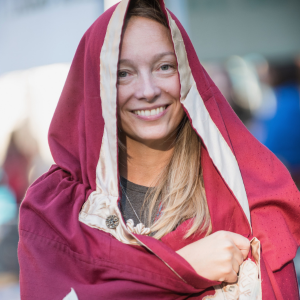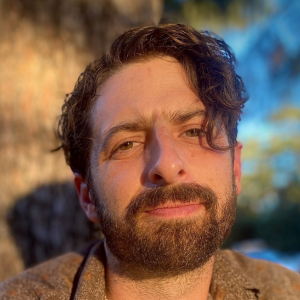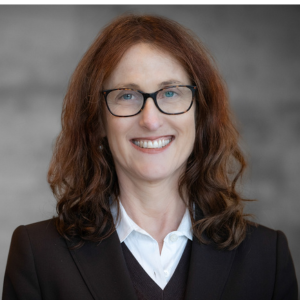Over the past seven years or so, our core faculty has developed strong, generative relationships which allow us, generally, to collaborate effectively. Collaboration has become increasingly central to how we integrate the horizontal and vertical curriculum. We also find that in our pedagogical reflections, class studies, curriculum trip development, festival innovation, retreat planning, student events, and in maintaining the overall wellbeing of the high school body, we rely on a way of working that assumes a creative engagement with each other. In sharing a bit about what has worked so far for us, we hope other Waldorf high schools may feel a stronger collective potential for this delicate art of education.
Instructors:
 Laura Guinan
Laura Guinan
Laura Guinan has been the visual arts teacher at the Emerson Waldorf High School in Chapel Hill, NC for 17 years. Along with teaching drawing, painting, printmaking, and sculpture, as well as a variety of media-specific techniques, Laura enjoys helping students hold a broad and integrated picture of their burgeoning art skills through the lenses of art and architectural history. She has developed a passion for cross-disciplinary collaboration with her colleagues in both the sciences and humanities. Inspiration to integrate art and art making as a vehicle for deeper learning and discovery has led to co-teaching classes as diverse as Environmental Justice, Native Geography, and Islamic studies (to name a few). During her tenure, Laura has served on EWS’s College of Teachers; Board of Directors; and as high school faculty chair.
 Amy Sutherland
Amy Sutherland
Amy Sutherland has been teaching English literature at the Emerson Waldorf School since 2013. Her passion is helping students create energetic, clear and vibrant writing that contributes a drop to the vital and endangered project of voicing human empathy and finding soul recognition. She finds joy in watching students broaden their perspectives- and learn to tell their own stories- as they journey through her literature classes. Recently returned from a senior trip to Ireland, Amy feels particularly inspired by the self-discovery found through critical reflection, a notebook and a new landscape. As high school co-chair, Amy works to foster open, trusting relationships among the high school faculty, creating an environment where new faculty members feel supported and heard, and there is a shared sense of trust and collaboration among all faculty.
 Catherine Reyes
Catherine Reyes
Catherine Reyes is the Life Sciences and Chemistry teacher at Emerson Waldorf High School, where she has taught for eight years. With a deep commitment to interdisciplinary learning, she has helped develop collaboratively-taught courses, such as Environmental Justice and Native Geography, which invite students to explore the complex intersections of science, history, culture, and the arts. At the heart of her work is the cultivation of ecological thinking - an awareness of the deep interconnection between all forms of life and the social systems that shape our world. Catherine believes students must be empowered to question dominant cultural narratives and to act from a place of love and responsibility toward all of life. She emphasizes that no ecological issue is without a social dimension, and that students must be equipped to understand the ways environmental issues intersect with race, class, gender, and power. Her goal is to help students develop a sense of agency and belonging within a community of care, anchored in love for the Earth and a commitment to its well-being. Catherine holds bachelor’s degrees in Materials Science & Engineering and Literature from MIT, and a PhD in Bioengineering from Georgia Tech. Prior to her work in Waldorf education, she has worked as a research scientist, an independent grant writer, and the Director of Education at an engineering research center at Duke University, where she led programs in undergraduate and graduate education and developed hands-on STEM curricula for local schools.
 Gareth Dicker
Gareth Dicker
Gareth Dicker has been teaching physics and math at the Emerson Waldorf High School for the past eight years in Chapel Hill, NC. With a background in robotics, he is interested in questions of how human spirituality and culture are evolving in light of accelerating technological upheaval. His passions for musical improvisation, esoteric study, and various forms of movement (eurythmy, capoeira, rock climbing), inform his work. Over the past several years, he has been involved with the North American and Global Youth Section, with the Brightmoor Makers in Detroit, and with the Living Arts Collective in Durham, NC.
 Eric Meckley
Eric Meckley
Eric Meckley recently finished his eighth year as History and Humanities teacher at the Emerson Waldorf High School. He teaches semester long track classes in US History I & II, US Government, Econ & Social Studies, as well as Main Lesson Blocks in Colonial History, Ancient China, World History through Philosophy, Transcendentalism, and Academic Writing. He has taught (and co-taught) a number of electives including photography, graphic novel, radical printmaking, Weird Fiction, and Debate and Argumentation. Eric has a BA in interdisciplinary studies from The University of Chicago and a Master of Divinity from Duke University. He began teaching at Emerson while a full-time student in the PhD program in English and Comparative Literature at UNC-Chapel Hill. Eric eventually left the program with a second master's degree, trading the isolating, narrowly focused individual research of the Ivory Tower for the collaborative, artistic, interdisciplinary Waldorf classroom. He is focused on working with colleagues to find ways for material to be echoed, deepened, and reiterated across disciplines by drawing connections between history, literature, science, math, and the arts.





 The Earth as a Living Whole: Learning to Understand Climate Change
The Earth as a Living Whole: Learning to Understand Climate Change This interactive presentation invites teachers to stand at the intersection of two bustling roads: differentiation and soul economy. Through phenomenological experiments, artistic explorations, and discussion, we will examine some of the basic principles of deep learning and differentiation and imagine how they could be practiced in our classrooms in a way that respects the time and energy of the teacher.
This interactive presentation invites teachers to stand at the intersection of two bustling roads: differentiation and soul economy. Through phenomenological experiments, artistic explorations, and discussion, we will examine some of the basic principles of deep learning and differentiation and imagine how they could be practiced in our classrooms in a way that respects the time and energy of the teacher. In this session, I will share some thoughts of the varied purposes which have been allotted to Waldorf education, and ask if these remain unchanged in the 2020s.
In this session, I will share some thoughts of the varied purposes which have been allotted to Waldorf education, and ask if these remain unchanged in the 2020s. In 1998, education and social commentator Joseph Chilton Pearce spoke of his serious concerns about schools and education and his support for Waldorf education as a hopeful alternative. However, he added: “Waldorf is beginning to modify and accommodate, little by little.…in order to survive.” What does his concern mean 27 years later? What does it mean for high schools that are particularly susceptible to external pressures? What changes have our high schools made in order to survive? We will take up this question together, examining the impact over time of often small modifications and accommodations. We will explore how we can work with the imperative for innovation and change yet maintain and protect the enriched, transformative education that Steiner intended: an educational impulse that is needed more than ever to help our young people prepare for an unknowable future.
In 1998, education and social commentator Joseph Chilton Pearce spoke of his serious concerns about schools and education and his support for Waldorf education as a hopeful alternative. However, he added: “Waldorf is beginning to modify and accommodate, little by little.…in order to survive.” What does his concern mean 27 years later? What does it mean for high schools that are particularly susceptible to external pressures? What changes have our high schools made in order to survive? We will take up this question together, examining the impact over time of often small modifications and accommodations. We will explore how we can work with the imperative for innovation and change yet maintain and protect the enriched, transformative education that Steiner intended: an educational impulse that is needed more than ever to help our young people prepare for an unknowable future. Let's join together to celebrate the wisdom of Betty Staley by revisiting and reconsidering her developmental markers in the light of our modern moment.
Let's join together to celebrate the wisdom of Betty Staley by revisiting and reconsidering her developmental markers in the light of our modern moment. The Waldorf School impulse was thought of by its founders as one that facilitates the healing of the social organism. Following the catastrophe of WWI, many societies sought for a way to establish societal harmony - some turned to fascism, others embraced socialist or capitalist narratives. None of these have been successful in attuning human beings with their intentions and their social challenges. The skills and dispositions often characterised as "soft" are now more needed that ever - what contribution can teachers make in facilitating the development of kindness, confidence and sensitivity in their students? How do our graduates become agents for change?
The Waldorf School impulse was thought of by its founders as one that facilitates the healing of the social organism. Following the catastrophe of WWI, many societies sought for a way to establish societal harmony - some turned to fascism, others embraced socialist or capitalist narratives. None of these have been successful in attuning human beings with their intentions and their social challenges. The skills and dispositions often characterised as "soft" are now more needed that ever - what contribution can teachers make in facilitating the development of kindness, confidence and sensitivity in their students? How do our graduates become agents for change? Researchers continue to confirm negative health effects of excessive screen time, especially in childhood. Now a new body of research is revealing that overuse or misuse of educational technologies can also impinge on students’ autonomy by powerfully manipulating emotions, behavior, and unconscious beliefs. These risks raise ethical concerns beyond the impairment of learning, impacting fundamental human rights, emotional development, and ultimately the capacity to form a truthful sense of reality. As technologies of manipulation rapidly gain power and widespread use—including in Waldorf schools and our families’ homes—how can we protect students’ sense of self, access to reality, and ability to “give purpose and direction to their lives?
Researchers continue to confirm negative health effects of excessive screen time, especially in childhood. Now a new body of research is revealing that overuse or misuse of educational technologies can also impinge on students’ autonomy by powerfully manipulating emotions, behavior, and unconscious beliefs. These risks raise ethical concerns beyond the impairment of learning, impacting fundamental human rights, emotional development, and ultimately the capacity to form a truthful sense of reality. As technologies of manipulation rapidly gain power and widespread use—including in Waldorf schools and our families’ homes—how can we protect students’ sense of self, access to reality, and ability to “give purpose and direction to their lives?
 Laura Guinan
Laura Guinan Amy Sutherland
Amy Sutherland Catherine Reyes
Catherine Reyes Gareth Dicker
Gareth Dicker Eric Meckley
Eric Meckley The work of the Waldorf high school educator is to help adolescents slowly move toward forming independent judgments. Teachers are rightly nervous about being perceived as “political” or unfairly swaying students with their personal opinions. Nonetheless, we must create space in our classrooms to talk about challenging and potentially polarizing issues. How can Waldorf teachers bring topics such as abortion, transgender individuals, the wars in Ukraine, Gaza and elsewhere, the political reality in the US, income inequality, climate change, and more in ways that leave students safe to explore their own perspectives and free from having to conform to teacher, parent, peer, and community views? How do we achieve the balance in presenting information and fostering healthy student dialogue, discussion, and debate? How to help students find areas of agreement that allow for building consensus and community, without giving up individual beliefs? This final session will be a Starlight Rays community exploration after initial input from the presenter.
The work of the Waldorf high school educator is to help adolescents slowly move toward forming independent judgments. Teachers are rightly nervous about being perceived as “political” or unfairly swaying students with their personal opinions. Nonetheless, we must create space in our classrooms to talk about challenging and potentially polarizing issues. How can Waldorf teachers bring topics such as abortion, transgender individuals, the wars in Ukraine, Gaza and elsewhere, the political reality in the US, income inequality, climate change, and more in ways that leave students safe to explore their own perspectives and free from having to conform to teacher, parent, peer, and community views? How do we achieve the balance in presenting information and fostering healthy student dialogue, discussion, and debate? How to help students find areas of agreement that allow for building consensus and community, without giving up individual beliefs? This final session will be a Starlight Rays community exploration after initial input from the presenter.